Government of David Toro, 1936–37
David Toro assumed office as the 35th President of Bolivia on 22 May 1936, and his term ended upon his forced resignation on 13 July 1937. A colonel during the Chaco War, Toro's military prowess was matched by his political tact allowing him to assume leadership over the young officer corps which deposed the government of José Luis Tejada Sorzano on 17 May 1936 and handed him the presidency on 22 May.[1]
.jpg.webp) | |||
| Presidency of David Toro 22 May 1936 – 13 July 1937 | |||
| Party | Military Socialist | ||
|---|---|---|---|
| Seat | Palacio Quemado | ||
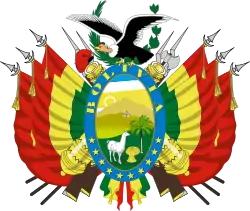 |
|---|
| This article is part of a series on the politics and government of Bolivia |
|
|
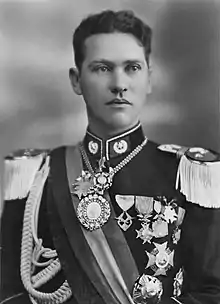
Toro presided over a civil-military junta made up of both military officers and left-wing politicians which constituted the 97th national cabinet of Bolivia.[2]
Cabinet Ministers
Cabinet of Bolivia Presidency of David Toro, 1936–1937 | ||||||||
|---|---|---|---|---|---|---|---|---|
| Office | Name | Party | Term | Prof. | N.C[lower-alpha 1] | P.C[lower-alpha 2] | ||
| President | Germán Busch[lower-alpha 3] | Mil-Soc. | 17 May 1936 – 22 May 1936 | Mil. | – | – | ||
| David Toro | Mil-Soc. | 22 May 1936 – 13 July 1937 | Mil. | |||||
| Vice President | Office vacant throughout presidency | |||||||
| Minister of Foreign Affairs and Worship (Chancellor) |
– | Enrique Baldivieso | PSU | 17 May 1936 – 11 November 1936 | Law. | 97 | 1 | |
| Minister of Propaganda | Enrique Finot[3] | PL | 11 November 1936 – 13 July 1937 | Law. | 97 | 1 | ||
| Minister of Government and Justice |
Julio Viera | Mil-Soc. | 17 May 1936 – 13 July 1937 | Mil. | 97 | 1 | ||
| Minister of National Defense | Gabriel Gosálvez | PSU | 17 May 1936 – 7 September 1936 | Eco. | 97 | 1 | ||
| Oscar Moscoso[lower-alpha 4] | Mil-Soc. | 7 September 1936 – 13 July 1937 | Mil. | 97 | 1 | |||
| Minister of Finance and Statistics |
Fernando Álvarez Campero | N/A | 17 May 1936 – 13 July 1937 | Law. | 97 | 1 | ||
| Minister of Industry and Commerce |
Jorge Jórdan | Mil-Soc. | 17 May 1936 – 6 August 1936 | Mil. | 97 | 1 | ||
| Arturo Guillén | Mil-Soc. | 6 August 1936 – 13 July 1937 | Mil. | 97 | 1 | |||
| Minister of Mining and Petrol |
Antenor Ichazo | Mil-Soc. | 17 May 1936 – 13 July 1937 | Mil. | 97 | 1 | ||
| Minister of Development and Communications |
Pedro Zilveti Arce | PRS | 17 May 1936 – 13 July 1937 | Law. | 97 | 1 | ||
| Minister of Education and Indigenous Affairs |
Raul Tovar | Mil-Soc. | 17 May 1936 – 12 October 1936 | Mil. | 97 | 1 | ||
| Alfredo Peñaranda | Mil-Soc. | 12 October 1936 – 23 November 1937 | Mil. | 97 | 1[lower-alpha 5] | |||
| Minister of Work and Social Security |
Waldo Álvarez | CSTB | 17 May 1936 – 17 January 1937 | Uni. | 97 | 1 | ||
| Javier Paz Campero | PSU | 17 January 1937 – 13 July 1937 | Law. | 97 | 1 | |||
| Minister of Agriculture, Colonization, and Immigration |
Luis Añez Rodríguez[lower-alpha 6] | Mil-Soc. | 17 May 1936 – 12 October 1936 | Mil. | 97 | 1 | ||
Composition
The majority of the civil-military junta consisted of military personnel, particularly members of the young officer corps. Of these, were the four lieutenant colonels; Julio Viera (Government and Justice), Jorge Jórdan (Industry and Commerce), Antenor Ichazo (Mining and Petrol), and Luis Añez Rodríguez (oAgriculture, Colonization, and Immigration).[6] Other members of the military included Major Raul Tovar (Education and Indigenous Affairs), and Colonel Oscar Moscoso (National Defense). This is not to mention lieutenant colonel Germán Busch, the provisional president of the junta until 22 May, as well as David Toro himself, who has a colonel. Leftist political and social movements were represented by Enrique Baldivieso, one of the founders and leader of the United Socialist Party (PSU).[7] Organized labor was represented by Waldo Álvarez, a key figure in the debilitating general strikes which set the stage for the stage for the coup.[8] Álvarez had been elected as a delegate to the junta by an assembly of the Workers Federation of Labor (FOT) and the Local Workers Federation (FOL).[9]
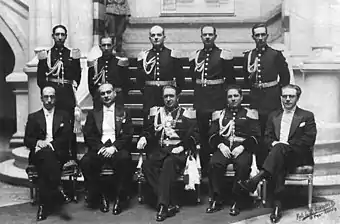
The composition of the cabinet was also significantly restructured, elevating the number of ministries to ten.[1][10] Four of these were the Ministries of Statistics (assigned to Finance), Immigration (to Agriculture), Commerce (to Development), and Indigenous Affairs (to Education). In addition, the Ministry of Propaganda was established as an office of the Foreign Ministry in late 1936. Furthermore, the Ministry of Mining and Petrol was formed, foreshadowing a more active involvement by the Bolviain government in the exploitation of its natural resources which would eventually lead to the nationalization of Standard Oil in March 1937.[11] Finally, the Ministry of Work and Social Security was established under the leadership of unionist Waldo Álvarez.[9] However, Álvarez would resign in early 1937 following the issuance of an "anti-communist" decree by Toro which led to the arrest of numerous senior officials. A second assembly of the FOT and FOL would elect Javier Paz Campero of the PSU to replace Álvarez.[9]
On 13 July 1937, dissatisfied with what he viewed as unending political compromise and pragmatism, Germán Busch lead a popular movement which forced the resignation of David Toro.[12] Busch was transmitted control of the junta, becoming de facto president. Many of the ministers in Toro's cabinet would remain in Busch's.
Established Ministries
- Office of Indigenous Affairs (under Education): Raul Tovar (Mil.), first holder from 17 May 1936[13]
- Office of Statistics (under Finance): Fernando Álvarez Campero, first holder from 17 May 1936
- Office of Immigration (under Agriculture): Luis Añez Rodríguez (Mil.), first holder from 17 May 1936
- Office of Commerce (under Industry): Jorge Jórdan (Mil.), first holder from 17 May 1936
- Ministry of Work and Social Security: Waldo Álvarez (CSTB), first holder from 17 May 1936[9]
- Ministry of Mining and Petrol: Antenor Ichazo (Mil.), first holder from 17 May 1936
- Office of Propaganda (under Foreign Affairs): Enrique Finot, first holder from 11 November 1936[13]
Gallery
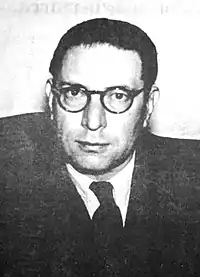 Enrique Baldivieso – Chancellor (PSU)
Enrique Baldivieso – Chancellor (PSU)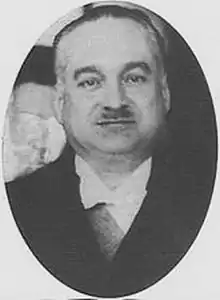 Enrique Finot – Chancellor (PL)
Enrique Finot – Chancellor (PL) Julio Viera – Minister of Government and Justice
Julio Viera – Minister of Government and Justice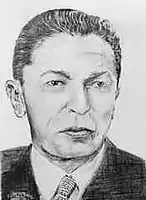 Gabriel Gosálvez – Minister of National Defense (PSU)
Gabriel Gosálvez – Minister of National Defense (PSU) Oscar Moscoso – Minister of National Defense
Oscar Moscoso – Minister of National Defense Jorge Jórdan – Minister of Industry and Commerce
Jorge Jórdan – Minister of Industry and Commerce Antenor Ichazo – Minister of Mining and Petrol
Antenor Ichazo – Minister of Mining and Petrol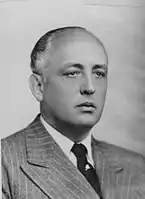 Pedro Zilveti – Minister of Development and Communications (PRS)
Pedro Zilveti – Minister of Development and Communications (PRS)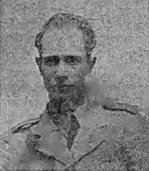 Raul Tovar – Minister of Education and Indigenous Affairs
Raul Tovar – Minister of Education and Indigenous Affairs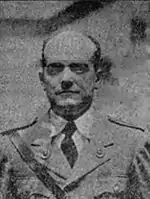 Luis Añez Rodríguez – Minister of Agriculture, Colonization, and Immigration
Luis Añez Rodríguez – Minister of Agriculture, Colonization, and Immigration
Notes
- Denoting which national cabinet the minister was originally a part of
- Denoting which presidential cabinet the minister was originally a part of
- Provisional President of the Junta from 17 May to 22 May 1936
- Acting Foreign Minister from 20 June to 4 September 1936[4]
- Held over into the Busch cabinet
- Acting Foreign Minister from 7 September to 19 December 1936[5]
References
- Klein, Herbert S. (1 February 1965). "David Toro and the Establishment of "Military Socialism" in Bolivia". Hispanic American Historical Review. 45 (1): 25–52. doi:10.1215/00182168-45.1.25. ISSN 0018-2168.
- Gisbert 2003, p. 342.
- "canciller". web.archive.org. 23 January 2016. Retrieved 3 February 2021.
- "canciller". web.archive.org. 14 July 2014. Retrieved 3 February 2021.
- "canciller". web.archive.org. 30 November 2015. Retrieved 3 February 2021.
- Boullón Barreto, Gustavo (1936). "Bolivia Socialist Republic".
- Political handbook of the world 1939. New York, 1939. P. 16.
- "La rebelión de mayo del 36". www.paginasiete.bo (in Spanish). Retrieved 3 February 2021.
- "Álvarez, el ministro obrero que hizo temblar al poder". www.paginasiete.bo (in Spanish). Retrieved 3 February 2021.
- Gisbert 2003, pp. 343
- "DECRETO SUPREMO No 13-03-1937 del 13 de Marzo de 1937 » Derechoteca.com". www.derechoteca.com. Retrieved 3 February 2021.
- Klein 1967, p. 169
- Gisbert 2003, pp. 343
Bibliography
- Gisbert, Carlos D. Mesa (2003). Presidentes de Bolivia: entre urnas y fusiles : el poder ejecutivo, los ministros de estado (in Spanish). Editorial Gisbert.
- Klein, Herbert S. (May 1967). "Germán Busch and the Era of "Military Socialism" in Bolivia". The Hispanic American Historical Review. XLVII (2): 166–184.